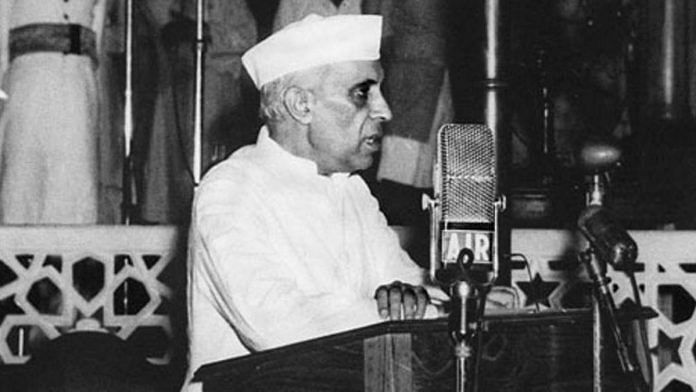The explanatory telegrams sent out by New Delhi to Indian embassies and high commissions in Washington, London, Ottawa, Canberra, Colombo and Rangoon (Yangon) after the decision on recognition was taken on 17 November used some of the reasoning from the two British memoranda. ‘We are strongly advised that delay in recognition may well be injurious politically and economically and may encourage wrong tendencies in China . . . Economically it must hamper normal trade and commerce and cause loss to those foreigners who are engaged in it [India had no trade to speak of with China]. The internal situation in many countries in south-east Asia, where there are large Chinese populations, also points to the need for early recognition . . . We note that this has been realized at the recent Regional Conference in Singapore’ (to which India was not invited since it was a meeting of British heads of mission and military personnel). Nehru assured the chief ministers that India would not be affected in the sense of any military danger even if the communist regime spread into Tibet. There were internal concerns on this account. Nehru had told Menon and Panikkar that while India would recognize communist China ‘it must be made clear to all concerned that any threat to Nepal, Sikkim, Bhutan, Ladakh or the McMahon Line areas will be resisted with all our force’. Yet the Government of India did not see it fit to convey this position to the new communist regime in Beijing or to seek confirmation on the boundary alignment at the time of according recognition.
The Americans made one final effort in early December to delay India’s proposed recognition of the communist regime. State Department officials advised Secretary Acheson to convey to the Indian Ambassador in Washington that hasty recognition by leading democratic powers might prove an ‘illusory benefit’ and might have ‘undesirable repercussions’ in Southeast Asia. Acheson met Vijayalakshmi Pandit, the Indian Ambassador in Washington, on 6 December. The outcome of that discussion is not available, but Ambassador Pandit had reported to Delhi just prior to her meeting with Acheson that ‘conversations with smaller members indicate that State Department not unwilling to recognize new Chinese regime but strong Republican opposition in Congress causes delay’. In hindsight, this might have been an erroneous judgement because the American policy was well-known.
Having succeeded in securing confirmation from the Government of India as to both recognizing the new regime in Beijing and a date for this, the British government turned coy about the precise timing of its own recognition. It took a month (till 15 December 1949) to confirm its decision to recognize the new regime. It was conscious that, as Bevin told the cabinet on 12 December, ‘it would be a stab in the back’ to the Americans. It did not wish to be the first to do so, although it had been the principal force in favour of accommodating the communists since the end of 1948. When it learnt that Nehru was keen to make the announcement before Britain, Britain was happy because this would make it easier to justify to the US as to why a concert of actions had not, after all, been possible. Prime Minister Attlee played to Nehru’s ego by telling him that Britain had taken the views of its Asian friends into account. Nehru, in his reply to Attlee, expressed his appreciation for ‘your taking into account views of Asian countries in regard to this problem which is primarily Asian’. The Government of India took care to keep the US informed. Nehru still hoped, perhaps based on Britain’s assurances, that the US would come around soon to recognizing the new regime and, in the meantime, understand India’s special position.
On 29 December 1949, the Government of India withdrew recognition from the Republic of China (Chiang Kai-shek’s government now based on the island of Taiwan) and informed its ambassador in New Delhi of the decision. On 30 December, via telegram, the Indian representative who had remained in Nanking after Panikkar’s departure informed Zhou Enlai of India’s decision to accord recognition to the PRC, and asserted that this act by India would further strengthen the ‘immemorial friendship’ between the two countries and would be conducive to the stability of Asia and the peace of the world. Britain followed suit on 6 January 1950. Bevin telegraphed Acheson to assure him that ‘this does not lessen our determination to resist communism in south east Asia’, while keeping up pretences that its hands had been forced by the ‘views of our Asian friends’
Nehru’s decision to recognize China was a strategic one based on his world view that India and China, as the major Asian powers, had to work together if India was to carve out an independent role in the Indo–Pacific region. His strategic instinct was sound. But the tactical planning was absent from the exercise. Recognition became an end in itself. It became a procedural matter, rather than a matter for negotiation in which bargaining would bring desirable outcomes beneficial to newly independent India’s national security. Wider consultation within the Indian system might have led to greater reflection on the issue, but instead the matter was discussed and decided upon within a closely held group of advisors around Nehru, and in close consultation with Britain.
 This excerpt from Crosswinds: Nehru, Zhou and The Anglo-American Competition Over China byVijay Gokhale has been published with permission from Penguin Random House India.
This excerpt from Crosswinds: Nehru, Zhou and The Anglo-American Competition Over China byVijay Gokhale has been published with permission from Penguin Random House India.



